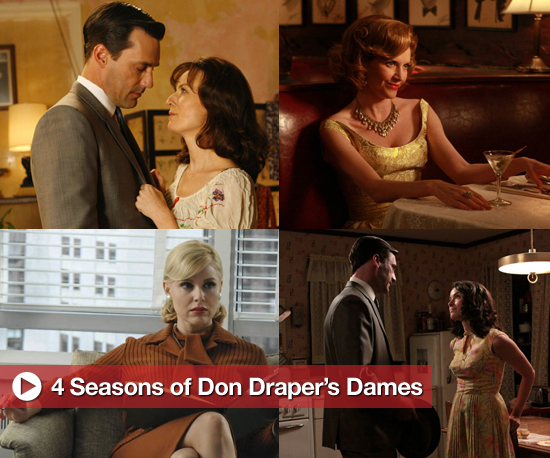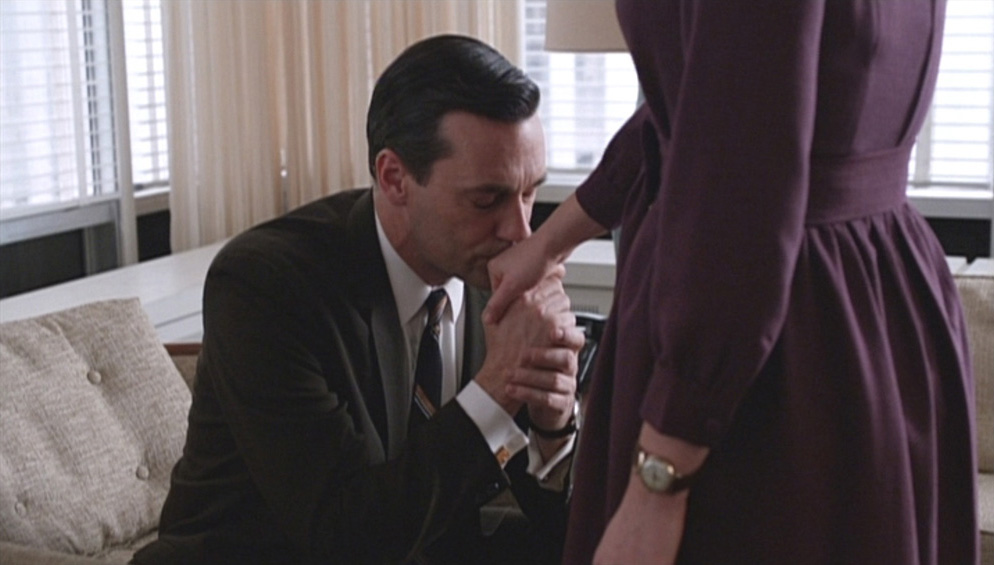"Going down?" In more ways than one, this season of Mad Men has ultimately been about Don's rapid decent to the point of no return, the lowest of the low, his own rock bottom. We should have seen it coming; that's the beauty of Mad Men, once you've reached the end, the beginning becomes clear and you realize what has been happening all along. Of course this season was going to end with Don losing everything and circling back to where all his issues began. You have to pass through hell in order to get to paradise; the opening of this season showed Don on a beach (a false paradise as Don is not at all happy in his idyllic surroundings) reading what can only be called "not beach reading material." Seriously, who reads the Inferno on their vacation? But now that Don has reached what is perhaps his lowest level of Hell, the Inferno fits better contextually.
"Midway upon the journey of our life/I found myself within a forest dark/For the straight-forward pathway had been lost."
Don has always been a lost scared little boy, looking for that missing piece of himself and now that he has hit middle age, it's becoming far more elusive and the path has been lost altogether. This season, Don has tried everything he could think of to locate his way: drinking, a whore/mother mistress, merging his company with their biggest rivals, speed, hash, toying with moving to California, and pitching ads that reek of desperation and despair, hoping someone might notice (and being Don, rebuffing someone when they did notice).
This episode was full of big moments for Don, but I want to focus on three: the pitch, the fall, and the homecoming. Hershey's wants to advertise (come to think of it, Don is right. Does Hershey even advertise to this day? They don't really need to, do they?) The pitch--the initial one before it all goes to Hell--is very reminiscent of Don's greatest pitch of all times, the Carousel Pitch. It's nostalgic and emotive and, reversely, unlike the Carousel pitch where Don is actually speaking from the heart and speaking of something that is actually true, the Hershey pitch is a boldface lie. Nothing Don says about this happy father and son is even remotely true. Don's father, as we have seen in flashbacks, was cruel and vicious; he beat Don, he kept any kind of affection from him. There was no tousling of hair, no buying of a candy bar after doing a job well done. Don really sells this lie by reminding the client that "the wrapper looked like what was inside." In other words, you know exactly what you're getting. This is perhaps when Don looses it; the line resonates with the client but Don begins to shake; it is one lie too many. The product that is Don--the real Don, the emotionally scared, suicidal, love starved little boy known as Dick--does not look like the wrapper, the cool, charismatic, sexy Don, and so he tells the truth. The truth of Don is not something potential clients want to hear; it's not something you can advertise to anyone, it's dark and sad and you can tell that it scares the clients and Don's so called friends and associates. One of the things that makes Mad Men is the extreme acting ability of its central character played by Jon Hamm. If he doesn't get the Emmy for this moment, then there is no justice in this world. His acting cues were spot on; like the episode where Sally found Don and Sylvia, Don rests his head in his hands, too disgusted and too horrified to really even look anybody in the face as he lays it all out on the table. The line "I dreamt of it...of being wanted" and his confession that the Hershey bought with stolen pick pocketed money as "the only sweet thing in my life" were heartbreaking and for one shinning moment, we remember what it was like to love Don, to not care that he is a self absorbed asshole who destroys lives.

 Part of me doubts that Don was actually surprised by the partner's meeting and the "leave of absence." He played it like he didn't see it coming, but that's the great irony of Don's life: his fear that if people learn about who he really is, what his past was really like, they will leave him, turns out to be true in almost every case. Bert Cooper may not have cared in season one that Don Draper was really Dick Whitman, but after the failed Hershey pitch and a season's worth of under-performing as Creative Director, "the verdict has been reached." Take your hat, take your briefcase, and take your mountain of issues and go regroup somewhere that isn't here. Everybody agrees with this decision, even Don's best friend Roger who has always admired Don for being wonderfully creative but also as depraved as he himself is--but even Roger, spoiled, upper class, rich boy Roger--has his limits. Right before this momentous moment, Megan storms out of the apartment because she has once again been screwed over by her husband; she was ready to move out to California and begin again and now Don has taken that away from her. This is the end, I would imagine, of Don's second marriage. Betty left when she learned who Don really was ("would you love you?" Betty asked coldly) and Megan finally sees the light; there is no fixing this marriage and she is gone. Now, Don has lost his daughter, his friends, his second wife, and his job. He has nothing and when we feel at a total loss, we go home.
Part of me doubts that Don was actually surprised by the partner's meeting and the "leave of absence." He played it like he didn't see it coming, but that's the great irony of Don's life: his fear that if people learn about who he really is, what his past was really like, they will leave him, turns out to be true in almost every case. Bert Cooper may not have cared in season one that Don Draper was really Dick Whitman, but after the failed Hershey pitch and a season's worth of under-performing as Creative Director, "the verdict has been reached." Take your hat, take your briefcase, and take your mountain of issues and go regroup somewhere that isn't here. Everybody agrees with this decision, even Don's best friend Roger who has always admired Don for being wonderfully creative but also as depraved as he himself is--but even Roger, spoiled, upper class, rich boy Roger--has his limits. Right before this momentous moment, Megan storms out of the apartment because she has once again been screwed over by her husband; she was ready to move out to California and begin again and now Don has taken that away from her. This is the end, I would imagine, of Don's second marriage. Betty left when she learned who Don really was ("would you love you?" Betty asked coldly) and Megan finally sees the light; there is no fixing this marriage and she is gone. Now, Don has lost his daughter, his friends, his second wife, and his job. He has nothing and when we feel at a total loss, we go home. Round and round and back home again. Don's homecoming is a first for him and for his family. No one has ever seen where little Dick Whitman grew up. This is not a place where he was loved, this is not a place full of happy memories. But this is how Don Draper came to be the man he is. He has revealed the truth to his coworkers and now, he needs to tell the most important person in his life: his daughter. Yes, Bobby and Gene were there too, but that scene was purely for Sally and Don. The look on Sally's face as realization struck was wonderful: horror, disgust, but also sympathy and understanding. Sally told Don earlier this season that she doesn't know anything about him and now she does. Sally is old enough to grasp that something happened to her father a long time ago that damaged him, and while it will take a long time to forgive him for what he did, it will come--after all, she is her father's daughter. While Don is rapidly falling further and further down, Sally is mimicking him. She is buying beer with a false ID, getting drunk and acting just like Don. Her moment of seeing Don and Sylvia has damaged her in the same way that Don was damaged by living with mother/whores. The question now becomes, will Sally run away after she's learned the truth about her father?
Round and round and back home again. Don's homecoming is a first for him and for his family. No one has ever seen where little Dick Whitman grew up. This is not a place where he was loved, this is not a place full of happy memories. But this is how Don Draper came to be the man he is. He has revealed the truth to his coworkers and now, he needs to tell the most important person in his life: his daughter. Yes, Bobby and Gene were there too, but that scene was purely for Sally and Don. The look on Sally's face as realization struck was wonderful: horror, disgust, but also sympathy and understanding. Sally told Don earlier this season that she doesn't know anything about him and now she does. Sally is old enough to grasp that something happened to her father a long time ago that damaged him, and while it will take a long time to forgive him for what he did, it will come--after all, she is her father's daughter. While Don is rapidly falling further and further down, Sally is mimicking him. She is buying beer with a false ID, getting drunk and acting just like Don. Her moment of seeing Don and Sylvia has damaged her in the same way that Don was damaged by living with mother/whores. The question now becomes, will Sally run away after she's learned the truth about her father?The other two plots this episode were Peggy and Pete and how they may have finally gotten what they wanted, but at a step cost. Peggy, after an entire season (ok, many seasons) of being ordered around and used by men (Don, Ted, Abe, ect) finally got that office view, but to do it, she had to lose the one thing she really wanted: love. Ted is officially scum and I'm glad he is moving out to Los Angles. Peggy was never anything more than a possession, he "never wanted anyone else to have her." Peggy and Ted's final meeting was acerbic and harsh; Ted has options, Peggy doesn't think she has any. Ted can start over in California with a family, Peggy must stay behind. Did anyone else notice what she was wearing in that final encounter with Ted? I'm almost 100% certain it was the blue and orange suit she wore in season five where she meets Ted in the diner and he basically offers her the world if she comes to work for him. Ted giveth and Ted taketh away. In the end, because of Don's blowup, Peggy gets her corner office--she becomes the boss, the wearer of pants (that pant suit was HOT and I want it.) I love that our final image of Peggy for this season is the back of her head as she stares out her new window, very Don Draper like. But it is also a little melancholy. That's not her job, not really. Don will be back someday and what happens then?
Pete now has nothing tying him to New York; he has lost all the anchors that once tethered him to the city. His father died several seasons ago and now his mother is dead at sea (probably at the hands of Monolo, which is hilarious and tragic all at once). Bob Benson managed to squeeze Pete out of the Chevy account (it was a terrible move on Bob's part, even if Pete is a really bad person). Pete's marriage to Trudy fell apart and he has very tenuous relationship with his daughter, Tammy. Unlike Don and Sally, we've never seen Pete and Tammy in any real father-daughter moments, so while the final scene of Pete and his child was very tender, it also felt very out of place. Pete finally gets to be free of everything and the only client man in the business, but as he told Trudy, "it's not how I wanted it."
Miscellaneous notes from In Care Of

--Joan lets Roger into Kevin's life, but not hers. I wonder if that will last; I'd like to see Joan and Roger together. Also, Joan, in that pumpkin and spice outfit, her leopard shirt, and green Thanksgiving day dress. Damn.
--Betty and Don have reached a new point in their post-marriage relationship. Betty isn't interested in getting back at Don for all the pain he caused and now she realizes that the divorce had some pretty nasty effects on her children. Despite her efforts, "the good is not beating the bad." I think Don and Betty will be more friendly from here on out, if only for the children.
--Pete may be a slime ball, but Vincent Kartheiser is a great actor and his, "Not great, Bob!" line was maybe the his best delivered line ever.
--Sassy Sally is Sassy and I love it. "I wouldn't want to do anything immoral. You know what, why don't you just tell them what I saw" she tells Don. BURN.
--Vixen by night Peggy. That was some dress.
--Pete and Ted are heading out to LA to start the SC&P west coast branch and I have a hunch Harry will be out there and a partner before long.
--Bob's apron is fabulous. I want it, if only because of its absolute ridiculousness.
--One more season and it's over. I protest this so much.


















